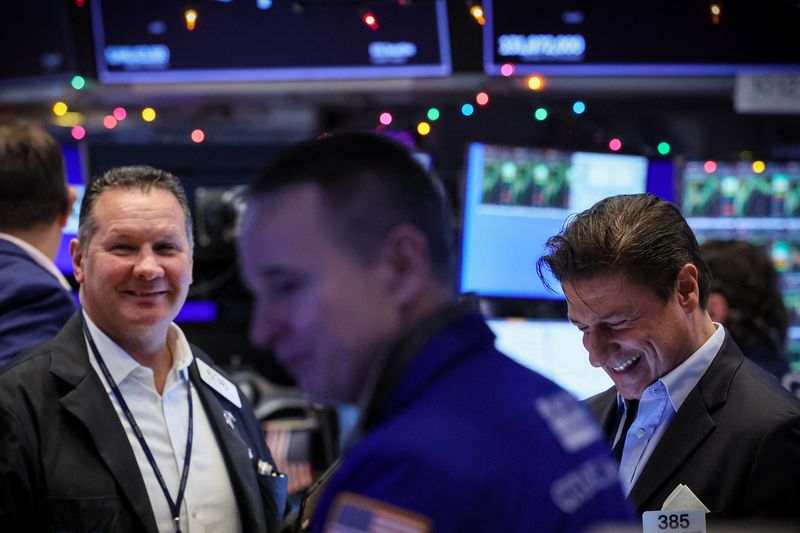[ad_1]

© Reuters. Traders work on the floor at the New York Stock Exchange (NYSE) in New York City, U.S., December 11, 2023. REUTERS/Brendan McDermid
By Chuck Mikolajczak
NEW YORK (Reuters) -U.S. stocks closed at fresh highs of the year on Tuesday, after inflation data did little to alter views for the timing of a rate cut by the Federal Reserve, as investors awaited the central bank’s last policy decision of the year on Wednesday.
The November Consumer Price Index (CPI) rose 3.1% on an annual basis, in line with estimates from economists polled by Reuters, as a drop in gasoline prices was overshadowed by a rise in rents. Core prices, excluding volatile items such as food and energy costs, also matched expectations, showing a 4% annual rise.
On a month-on-month basis, consumer prices ticked up 0.1% last month, compared with estimates of remaining unchanged.
Markets had recently been pricing in a rate cut by the Federal Reserve as soon as March, but traders pared those bets and are now targeting May for the first rate cut after the central bank began its hiking cycle in March 2022.
Expectations for a cut of at least 25 basis points in March fell to 43.7%, from about 50% before the data, according to the CME Group’s (NASDAQ:) FedWatch Tool. The market is now pricing in a chance of about 78% for a cut in May, up from about 75% on Monday.
“The market is certainly assuming that inflation is going to keep coming down, that earnings in this next year are going to show some decent growth and the Fed is going to cut rates,” said Scott Wren, senior global market strategist at the Wells Fargo Investment Institute in St. Louis.
“The market is counting on more of a soft landing that would allow the Fed to ease up.”
The rose 173.01 points, or 0.48%, to 36,577.94, the gained 21.26 points, or 0.46%, to 4,643.70 and the gained 100.91 points, or 0.70%, to 14,533.40.
The Dow closed at its highest level since Jan. 4, 2022, the S&P 500 its highest close since Jan. 14, 2022, and the Nasdaq its highest closing level since March 29, 2022.
Wren also said stocks were facing resistance at their highs of the year, with a strong push to the upside unlikely for the near-to-intermediate term.
Another factor dampening volatility could be an options expiration at the end of the week, with the S&P 500 not registering a move of 1% in either direction for 19 straight sessions, the longest such streak since August.
Markets will get another look at inflation data in the form of the Producer Price Index (PPI) before all eyes turn to the Fed’s policy announcement at the conclusion of its two-day meeting on Wednesday.
The European Central Bank and the Bank of England are also scheduled to deliver their policy verdicts later this week.
Oracle (NYSE:) slumped 12.44% as the cloud services provider forecast third-quarter revenue below estimates on slowing demand for its cloud service.
Energy was the worst-performing of the 11 major S&P sectors, falling 1.35% as crude prices settled down nearly 4%. The tech sector, however, was among the best-performing, rising for a fourth straight session to close at a record high of 3,344.07, on track for its biggest yearly percentage gain since 2019.
Google-parent Alphabet (NASDAQ:) dipped 0.58% after “Fortnite” maker Epic Games prevailed in its high-profile antitrust trial over the company.
Advancing issues were roughly even with decliners on the NYSE while declining issues outnumbered advancers by a 1.3-to-1 ratio on the Nasdaq.
The S&P 500 posted 74 new 52-week highs and 2 new lows while the Nasdaq recorded 198 new highs and 187 new lows.
Volume on U.S. exchanges was 10.52 billion shares, compared with the 10.95 billion average for the full session over the last 20 trading days.
[ad_2]
Source link











